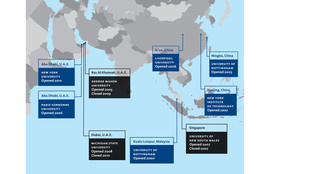 loading
loading
Singapore spinoff Mark Zurolo ’01MFAEducational ventures in Asia have become commonplace for American and European universities: hundreds of study-abroad, joint-degree, research, and language programs have been forged. As shown above, a few universities have taken the further step of opening full-scale, degree-granting branch campuses in Asia; not all of them have succeeded. Yale’s proposed partnership with NUS would be the first to offer an American-style liberal arts curriculum. View full imageImagine that you’re a professor, and someone gives you a blank piece of paper and asks you to design a college—the curriculum, the buildings, the faculty, the extracurriculars. There are no existing departments whose constituencies must be satisfied, no traditions and customs that students and alumni are loath to change, no buildings whose limitations must be considered. You are free to imagine the ideal undergraduate education. That was essentially the charge given to three committees of Yale professors and administrators last year after talks with Singapore began. “We all had way too much fun,” says Charles Bailyn ’81, an astronomy professor who chaired a committee on faculty development for the college. “We kept going out to dinner and had all these bright ideas. We had to stop ourselves from getting carried away and coming up with the reading lists for the courses, which will be the faculty’s job, after all.” Bailyn himself was so carried away that he agreed to be the college’s dean of faculty and go to Singapore for its first year of operation. “It’s because the enthusiasm was so high that Yale is pursuing this,” he says. On the curricular front, the ideas run something like this: what if all seniors were able to engage in an intense, focused research project? What if faculty could design rigorous, meaningful science courses for non-scientists? What if students spent the beginning of each semester in intensive two-week mini-courses, at different levels and with varied perspectives but all on the same grand topic, so everyone would be discussing black holes or War and Peace outside of class? And, most important—this is something that everyone involved with the project mentions again and again—what if there were a core curriculum that made students familiar with the history of thought and culture not just in the Western world, as Yale College’s optional Directed Studies program does for freshmen, but in the entire world? Former Law School dean Anthony Kronman ’72PhD, ’75JD, who co-chaired the curriculum committee, gives some examples: “a course on the art of war where your principal texts are Sun Tzu and Thucydides; Confucius and Aristotle on the wise man. Or Plato’s Republicand some selections from the Upanishads on the theme of reality of illusion. The great enduring human themes of love, danger, political action, war and peace, truth and illusion, all of these can be pursued, but now drawing on a repertoire of materials from vastly different civilizations whose juxtaposition has got to enrich the experience of the students studying these works.” This idea—a liberal arts curriculum that looks at the world’s cultural traditions in dialogue—has enthusiastic Yale faculty enthralled, for two reasons. First, if Yale hopes to popularize liberal education in Asia, such a curriculum will be necessary to make the liberal arts relevant there. Second, globalization is making a broader knowledge of non-Western culture increasingly important for graduates of schools like Yale itself. Curricular innovations from Yale-NUS might very well find their way back to New Haven. Yale imagines using the new college as a workshop in other areas, too, including extracurricular and residential life. Some of the differences between the residential colleges at Yale and Yale-NUS would be the result of necessity. For one, the NUS site is small, so the three residential colleges there will have to be high-rises. Moreover, the tropical climate would make enclosed courtyards stuffy, so the common space will need to be configured so as to capture welcome breezes. But planners are also considering some other changes that could strengthen the relationship between academics and residential life, including more faculty apartments, offices, and classrooms within the colleges themselves. As for extracurriculars, the planners say they’d like to have extracurricular life more deliberately integrated into a student’s education. What if there were formal opportunities for students to report on their summer internships and study-abroad trips, or leadership seminars for campus newspaper editors, team captains, and club presidents?
|
|